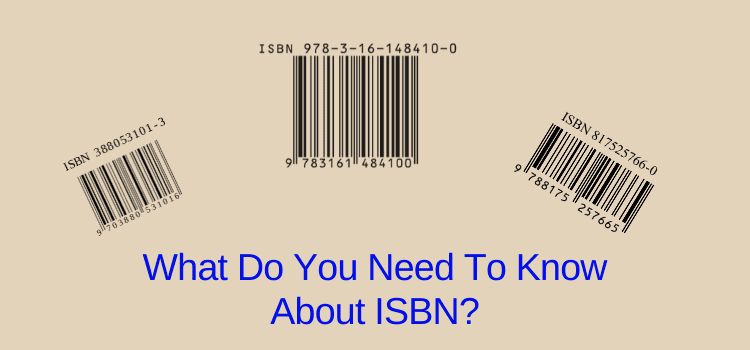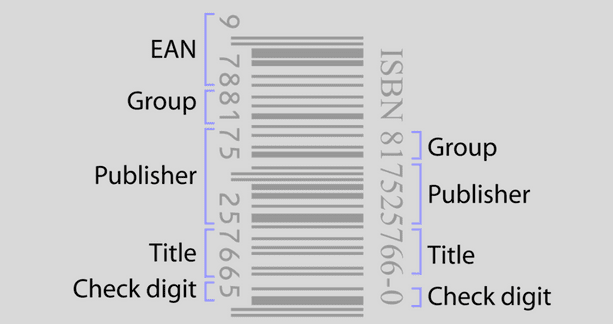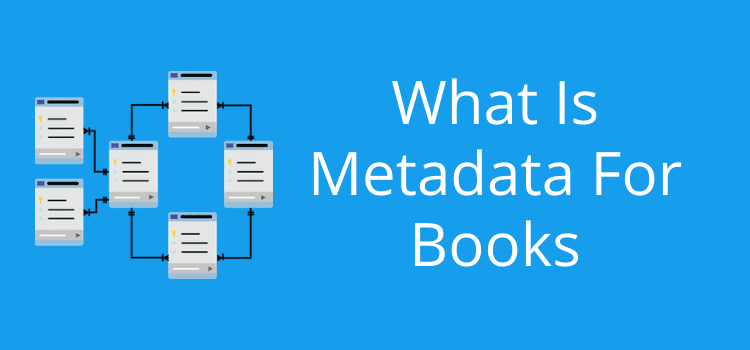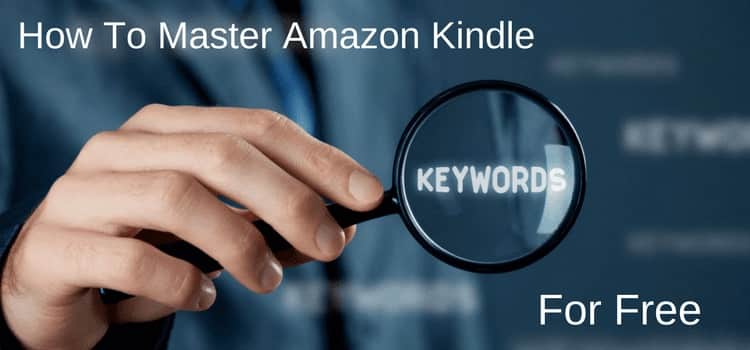
Yes, you will need an ISBN when you self-publish a print book.
However, most self-publishing services like Amazon will add one to your book for you or for free.
Amazon assigns an ASIN for ebooks, but other services offer a free ebook ISBN.
If you prefer, you can buy an ISBN. But for self-publishers, it’s rarely necessary.
What is ISBN?
ISBN stands for International Standard Book Number and can be a 10 or 13-digit number.
It appears on the copyright page and on the back of books.
For a publisher, it is a unique identifier.
All published books require a unique number to identify the publishing company and the title.
The numbering systems give enough information about a book to make each one a unique ISBN.
It includes a prefix, group identifier, publisher identifier, title identifier, and check digit.
For 13-digit codes, there is also the EAN, which is the European Article Number.
An important note is that every book version requires a unique ISBN.
If you publish a book in paperback, hardcover, or ebook, each version will need its own number.
Lastly, once a number is assigned, it can’t be changed.
Why are there two ISBNs?

Since 1970, books have had a unique 10-digit ISBN.
Then, in 2007, the 13-digit number was added to overcome a perceived shortage of ISBNs in some parts of the world.
It was introduced to be compatible with the European Article Number (EAN) barcode system used for retail products.
The EAN system is a barcode system used worldwide, making it easier to track and sell books internationally.
The additional three digits in the ISBN-13 provide more room for identifying individual editions, formats, and book variations.
A shortage hasn’t seemed to have eventuated, though.
Most books now have two numbers, 10 digits and 13 digits, which makes the system a little confusing.
All my books on Amazon have two listed in the book details.
However, I don’t think it’s an issue for readers.
But in the future, the 13-digit number may fully replace the older version.
The only points to understand are that these numbers are essential to the supply chain for books.
If you want to sell your book, you will need an assigned ISBN for every version.
Every version means paperback, hardcover book, ebook, and audiobook.
How do you get an ISBN?
You have two choices to obtain an ISBN. You can buy one or get a free ISBN.
If you want to buy your numbers, you will need to contact an international ISBN agency to get a national ISBN.
In the United States, R. R. Bowker is the sole provider of ISBN numbers.
When purchasing ISBNs, prices range from about US$125 for a single number. But you can buy packages of 10 for around $295. Source Bowker.
However, if you publish with Amazon, Smashwords, Draft2Digital, or in fact, most self-publishing platforms, they all assign a free ISBN.
So what’s going on here?
Do you need to buy an ISBN?
Let’s look at what happens if you buy ISBNs.
The logical benefit of owning your ISBN is that if you publish and make your book available on many retailers, your sales data for your book titles will be cumulative.
So if you are hoping to make it into the New York Times bestsellers, having your book sales divided up isn’t going to help at all.
There is also a sense that you are in control because you can use the same ISBN on every publishing platform you use.
All of that is logical, and it makes sense.
Except that publishing platforms and online retailers don’t necessarily play the same game, especially when it comes to ebooks.
Do you need an ISBN for ebooks?
On Amazon, you can’t use an ISBN because it uses an ASIN (Amazon Standard Identification Number) to identify Kindle ebooks. Amazon is also usually listed as the publisher.
However, some retailers, such as Kobo and Tolino, downstream to smaller retailers that do not support ISBN search.
However, Apple and B&N Nook support it. But Apple only supports the 13-digit number.
So you can have an ISBN for most epub versions you publish, but sales from your biggest selling outlet, Amazon, won’t count because you can’t use your ISBN.
Remember that you need a separate number for all your print and ebook versions. It can all become a confusing and expensive exercise.
Lastly, if you buy an ISBN and apply it to an existing title, it will become a totally new book.
Then you will lose all your previous sales data. So forget about buying one if your book is already self-published.
Is a free ISBN a better choice?
Well, yes. They are free, which is one big plus.
The biggest drawback is that you cannot transfer them between publisher services and retailers.
If you have published on Smashwords and used a free ISBN, you cannot use that number to publish with Draft2Digital.
It’s the same with print books. If you publish with Lulu, you cannot transfer that number to Blurb or KDP.
When you check your Amazon Author page, there is a tab to check your NPD Bookscan data.
With free ISBNs, you will be lucky to see much activity if you publish your book under a few different numbers.
On the plus side, though, search engines treat free and paid ISBNs the same.
Both Google and Bing use an ISBN database to return results for all books in print as well as ebooks and audiobooks.
An ISBN identifies a book, so your title will be treated exactly the same as Harry Potter!
Update note: Free ISBNs are no longer available on Amazon KDP for low content books.
What’s the best option for ISBNs?
Do you really require an ISBN? There is no right or wrong answer.
If you want to be in control of your book publishing and you can afford the considerable extra cost, you might think about buying an ISBN.
Bear in mind, though, that you will need one for every book version. So if you have a paperback, ebook, and audiobook, your ISBN cost will be a minimum of $300.
The costs can add up very quickly if you have more than one title.
Also, if you have existing titles and change the ISBN, you will lose your book’s data and basically be starting from scratch with a new book.
With a free number, there are not a lot of issues that should concern most self-publishing authors.
The only downside is that your book sales will not be calculated as a total across all retailers.
But unless you are selling hundreds of print book copies a week, this will not be much of an issue.
Well, unless you think your book has a chance of getting into the national bestseller lists.
There are more worthwhile expenses, such as book covers, editing, and book promotion, that can help get book sales.
An ISBN is certainly not going to do a lot to help sell your book.
Conclusion

In a way, ISBNs are a relic of a past when books were only sold in brick-and-mortar stores as part of a tightly controlled market.
The ebook and self-publishing have thrown a huge spanner into the works.
It is impossible now to track every book and every sale, which was the case in 1970.
Yes, the ISBN and bar code are still useful for making every book unique.
But apart from that benefit, there is not much else. If you mainly sell Kindle ebooks or get an income from Kindle Unlimited, an ISBN is a non-event.
Amazon assigns an Amazon Standard Identification Number (ASIN) number to ebooks.
Amazon uses a 10 or 13-digit International Standard Book Number (ISBN) for books in other formats. These are usually a free ISBN.
If you sell print book copies on Amazon and Barnes & Noble, does it matter what number is on the back of each copy?
Self-publishers know that a large proportion of their ebook sales will come from Amazon.
So why fret about a different number on the small percentage of sales from Apple, Nook, and Kobo?
In all honesty, I have never worried about what numbers or codes are on my books.
I will never sell enough to threaten Ian Rankin or James Patterson, so why would I spend a lot of money on a number?
The only numbers that count are dollars in the bank each month, and I have never considered that an identifying number helps much in this regard.
But perhaps, ISBNs can still be useful in certain situations.
Related reading: What To Include On The Copyright Page Of Your Book




Hi Derek, thank you for an excellent article. Just one question that you don’t appear to cover. If someone has self-published and printed a book without an ISBN and later decide to obtain the ISBN, would they need to reprint the book or can a sticker be placed on the book with the ISBN?
I believe you can, Anthony. Here is a snippet from ISBN(dot)org that might answer your question. The last sentence seems to say that you can apply an ISBN sticker.
“As defined by the ISO Standard, the ISBN publisher prefix (or “root” of the ISBN) identifies a single publisher. If a second publisher subsequently obtains an ISBN from the assigned publisher’s block of ISBNs, there will be no change in the publisher of record for any ISBN in the block as originally assigned. Therefore, searches of industry databases for that re-assigned ISBN will identify the original owner of that assigned prefix as the publisher rather than the second publisher. Discovering this consequence too late can lead to extensive costs in applying for a new prefix, re-assigning a new ISBN, and potentially leading to the application of stickers to books already printed and in circulation.”
Please correct me if I’m wrong, but as I understand these things:
1. You DO need an ISBN for Amazon if you wish to use their “Look Inside” feature. The ISBN is part of how they verify you own the copyright, apparently.
2. If you don’t provide an ISBN to Amazon, they list your ebook as being published by Amazon Services or something, NOT your name or imprint. Same applies to the other companies that supply you with “free” ISBNs. They’re not really free, because they grab a slice of your IP in exchange for supplying you something they pay a pittance for by buying in bulk. Also, some readers, apparently, still check for imprint names bc professionals use their own.
3. If your aggregator goes belly-up — and this is always a possibility with private companies — they take their ISBNs to Hell with them. And you, the independent publisher, go through hell trying to recover your own dang books on retailer websites around the world.
My bottom line. As an independent publisher, you’re a professional who’s in business for yourself. You write like a pro? Run your dang business like a pro.
1. No, you don’t need an ISBN to appear in Amazon’s Look Inside preview.
2. Yes, if you don’t supply an ISBN, Amazon may show as the publisher name, but not always.
3. Yes, if an aggregator goes out of business, your free ISBN will go with ot.
There are multiple inaccuracies in this article. For example “On Amazon, you can’t use an ISBN” Yes you can. You can choose to let them assign an ASIN or use an ISBN you purchased. I won’t correct a few of the other inaccuracies but the editorial team of this site should do a better job of checking work before they let it go live.
Once again, the article is inaccurate. There is no obligation (probably has never been and most likely will never be) for the book to have ISBN. It’s helpful, it makes you look more ‘professional’, it opens new channels to you, but you are allowed to publish your titles without it. So no, they are NOT necessary.
Sure, there is no need for an ISBN, but why wouldn’t you use one if it’s free. Hardly what I’d call an inaccuracy.